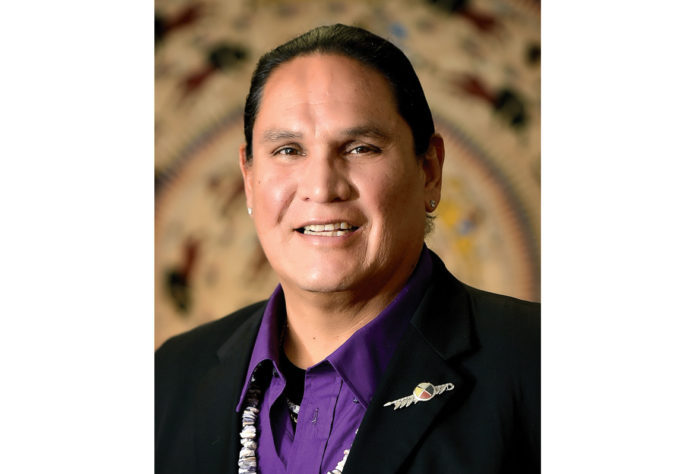by Ernest L. Stevens, Jr.
At the onset, the founders of the Indian Gaming Association (IGA) determined that – in addition to protecting the rights of tribal governments to use gaming to build Native economies – our mission would focus on protecting and strengthening tribal sovereignty.
At its core, tribal sovereignty is the inherent authority of Indian tribes to manage their lands and activities on those lands. Tribal sovereignty also is the political status of Indian tribes as governments, and the recognition of that status by other governments. In short, tribal sovereignty reflects and respects the fact that tribal governments are best situated to make decisions that impact their communities.
Tribal sovereignty is not a new concept. Indian tribes governed their lands and communities long before contact from other nations. When Europeans made first contact, they found vibrant, distinct Native Nations with diverse cultures and governing structures. The European nations acknowledged tribal sovereignty when they entered into treaties with Native Nations to secure peace and build trade relationships.
Upon its formation, the United States likewise recognized the governmental status of Indian tribes and engaged in several hundred treaties with tribes for the same purposes. The U.S. Constitution acknowledges tribal sovereignty in several provisions. The Commerce Clause acknowledges that Indian tribes, foreign nations, and the several states are distinct separate sovereigns. The Treaty Clause acknowledges that tribal treaties are the “Supreme Law” of the land. And the references to “Indians not taxed” in the apportionment clause and the Fourteenth Amendment recognize that individual Indians are citizens of Native Nations.
This early respect for tribal sovereignty was sadly followed by a series of misguided federal policies that forced the removal of tribal governments from their homelands, resulting in dozens of trails of tears. Subsequent policies fostered the taking of Indian lands and stealing Native children from their families – where they were forced into federal government boarding schools and forbidden from speaking their language or practicing their religion.
These limits imposed on tribal sovereignty forced Native communities to rely on the United States or state governments to prioritize Indian Country concerns, particularly in the case of Public Law 83-280.
Every instance where the U.S. imposed limits on tribal sovereignty proved to be an abject failure. Limits on tribal court power to prosecute crimes on Indian lands has led to the crisis of missing and murdered Native people. Federal pass-through programs result in Native community needs for housing, infrastructure, and education to go ignored.
However, our ancestors persevered. They fought and many made the ultimate sacrifice to protect tribal sovereignty and our way of life. This, as President Nixon proclaimed, is a “record of endurance, of survival, of adaptation and creativity in the face of overwhelming obstacles.”
With Nixon’s special address to Congress on July 8, 1970, the United States repudiated these past failed policies, renewing respect for tribal sovereignty and ushering in the current federal policy of supporting tribal government self-determination.
The seeds of Indian gaming were planted with this restored respect for tribal sovereignty. Native leaders embraced the Tribal Self-Determination policy and took matters into their own hands to rebuild Indian communities by opening the first modern-day Indian gaming operations.
These acts of tribal sovereignty were met by legal challenges, which eventually led the founders of the Indian Gaming Association to unite and form in 1985. With Indian gaming under direct attack in the courts and in Congress, IGA’s early focus was on educating the public and policy makers about the benefits of Indian gaming to tribal governments and our neighbors. For much of our first two decades, IGA worked to defeat dozens of misguided legislative proposals to amend the Indian Gaming Regulatory Act to the detriment of tribes and we fought back proposed regulations that sought to destroy the economic viability of Class II Indian gaming.
At the same time, over the past four decades, IGA has worked in partnership with our Member Tribes and sister tribal organizations to make significant strides to strengthen tribal sovereignty.
In just the past decade, our work resulted in amendments to the Violence Against Women Act to enhance respect for tribal sovereignty by acknowledging that tribal governments have authority to prosecute crimes against Native women and children regardless of their status as Indian or non-Indian when those crimes are committed on Indian lands.
In 2014, we led the charge to enact the Tribal General Welfare Exclusion Act, which amended the U.S. Tax Code to place Indian tribes on par with other governments for purposes of the longstanding “General Welfare Doctrine.” That law exempts government-provided social programs provided to citizens from federal taxation. The Act also forced reforms within the Treasury Department to give tribal governments a direct voice within that agency.
For decades, federal laws directed funding and resources to state, local and territorial governments, leaving tribal governments as an afterthought. In these instances, tribal governments are forced to seek “pass-through” funding from the state governments. Pass through programs never work, and more importantly, they ignore the U.S. Constitution’s recognition of Indian tribes as separate, distinct governments in our system.
Thanks to our work, Congress is increasingly passing laws that respect tribal sovereignty by providing direct funding to Indian tribes. Examples of recent laws that provide funding directly to tribal governments include the pandemic recovery programs authorized through the CARES Act and the American Rescue Plan, the Bipartisan Infrastructure Law, and many others.
We are making gains, but we know there are challenges ahead. Tribal sovereignty faces some of the most serious threats before the federal courts in recent memory. These misguided attacks make the false claim that federal laws that respect tribal sovereignty are based on race. These claims ignore the U.S. Constitution’s clear expression of Indian tribes and Indian citizens as separate political entities, and a half century of legal precedent.
As noted above, the Constitution references “Indian tribes” and “Indians” several times. As a result, the anti-tribal sovereignty movement argues that the Constitution itself is unconstitutional.
While these attacks lack merit, Indian Country is united in opposition because we know what is at stake – tribal sovereignty, and with it the ability to make decisions to govern our lands, our communities, and our very way of life.
Ernest L. Stevens, Jr. is Chairman of the Indian Gaming Association. He can be reached by calling (202) 546-7711 or visit www.indiangaming.org.
















































